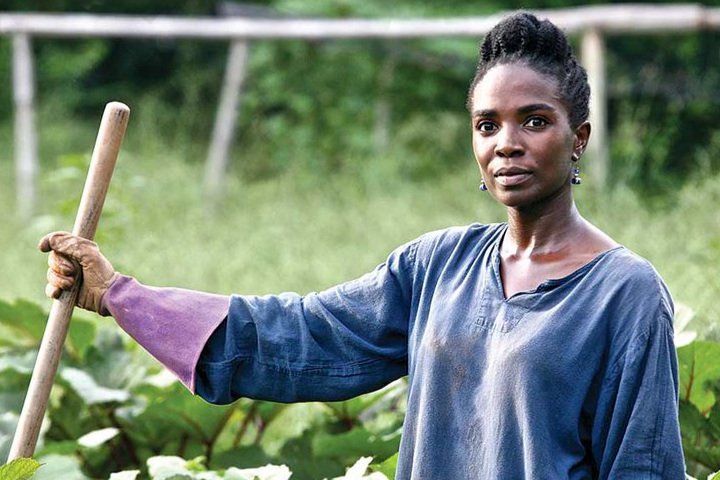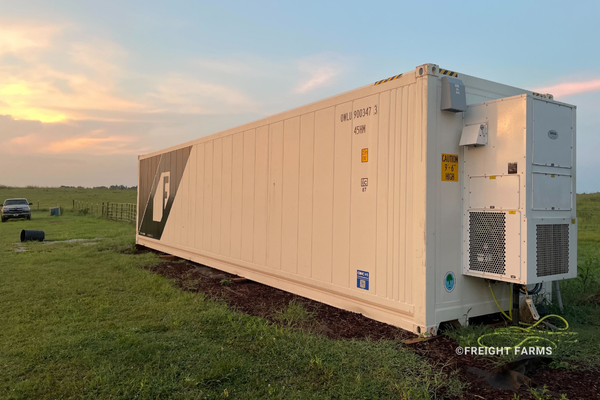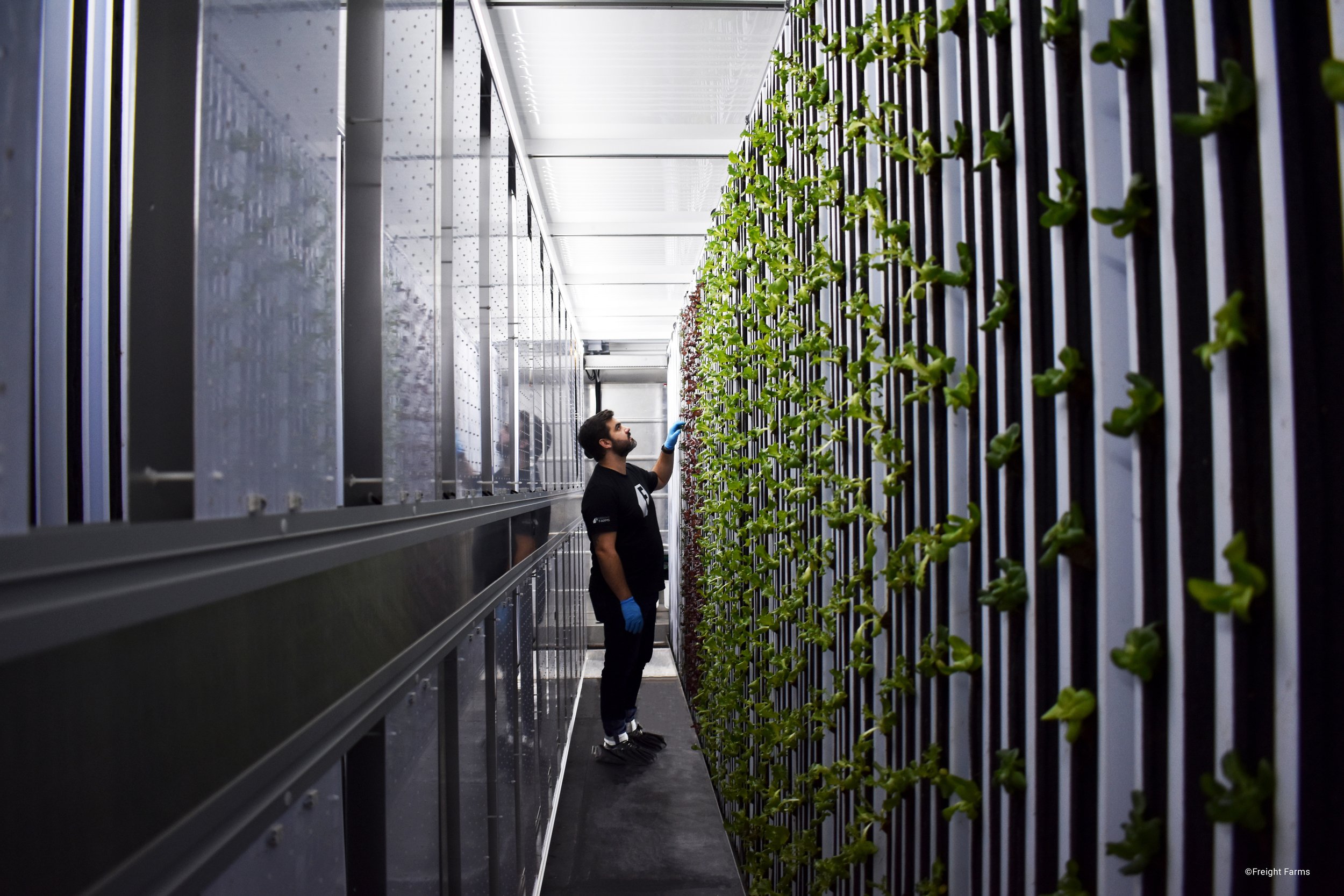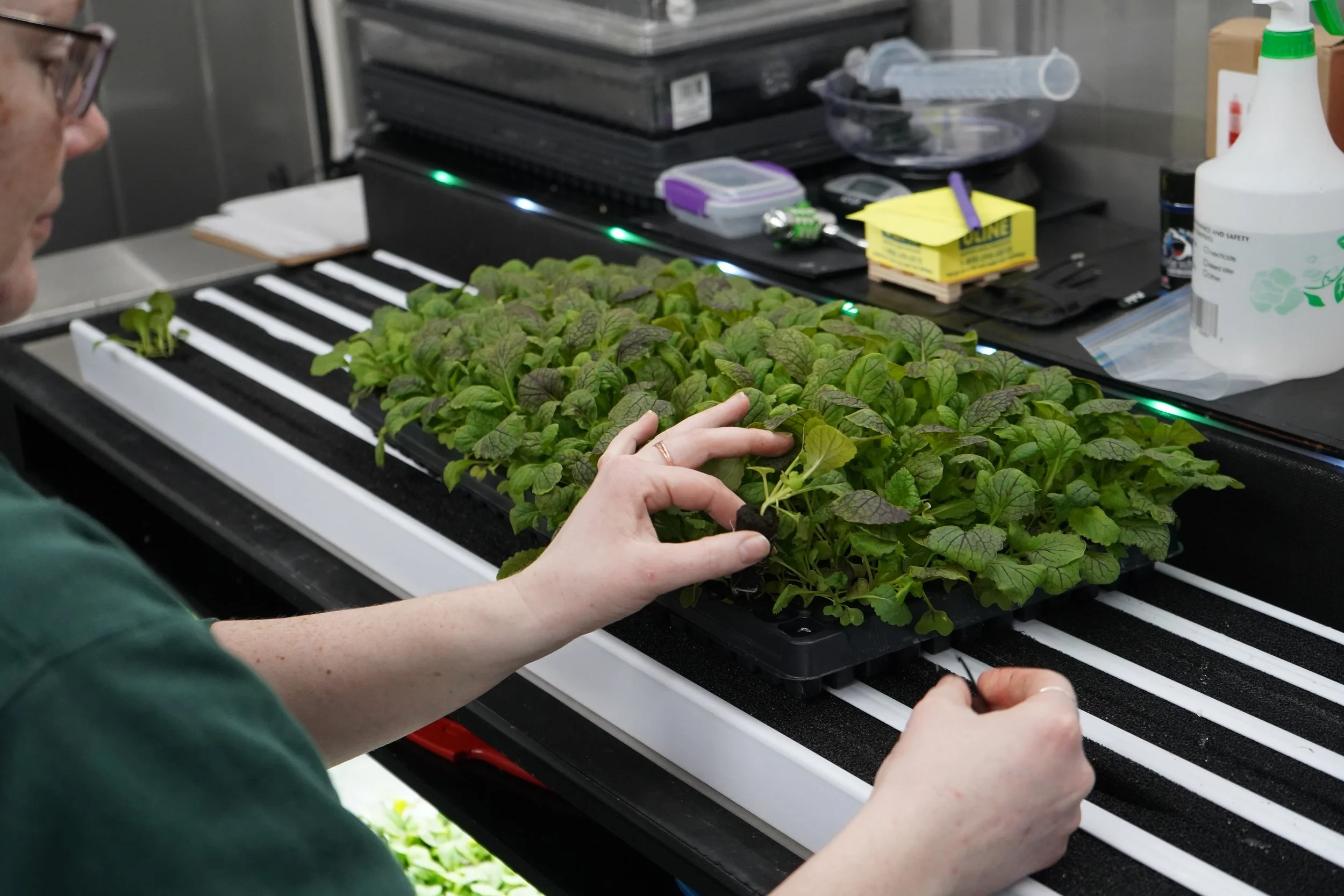14 Awesome Female Leaders in Agriculture
Meet 14 women in farming that are redefining “farm-to-table” in 2023
This International Women’s Day, we’re celebrating the female farmers, entrepreneurs, leaders, and disruptors who inspire us every day. These women have gone above and beyond to bring positive change to food and agriculture in communities around the world! Some are Freight Farmers (we can’t help but love our fierce farmers), some are advocates, some are movers and shakers beyond our vertical farming bubble — but all these female leaders in agriculture are inspiring.
1: Jill Frey of Superbloom Farms
Jill puts three Freight Farms to use growing food in Grand Rapids, Michigan. Driven to action when she heard how much more food farmers would need to produce to feed the world’s expected population in 2050, she started Superbloom Farms in 2021 to do her part on a local level. She sells to grocery stores, getting hyper-local, super-fresh produce to the residents of Grand Rapids.
2: Monalisa Shroff of Freight Farms
Monalisa is a leading force in the AgTech world. Formerly the Chief Financial Officer for Lettuce Grow, she was appointed the CFO of Freight Farms in 2021. We’re proud to have a woman helping to lead our company into the future.
“We are at the forefront of sustainability and the growing trends towards plant-based diets. This is our greatest opportunity: to provide our customers in the entire world a sustainable solution for hyper local food.”
Image Credit: Lise Metzger for Good Food Jobs
3 & 4: Taylor Cocalis & Dorothy Neagle of Good Food Jobs
These two business partners run one of the leading job boards for the food and agriculture industry, Good Food Jobs. Beyond posting jobs, they make good of their position of power by taking a stand: They require fair wages and inclusive practices for all the jobs they list on their website.
5: Alex Armstrong of Fare House Farms
A Freight Farmer in Texas, Alex has taken farming and entrepreneurship to a whole new level with Fare House Farms by turning her vertically grown calendulas into salves, tinctures, and oils, and by selling seedlings in addition to fully grown produce. She helps spread word about the good of vertical farming by hosting container farming tours and demos at her farm.
Image Credit: Forbes
6 & 7: Suzanne McDowell and Karen Colberg of King Arthur Baking Company
Suzanne and Karen share the highest office at King Arthur Baking Company as co-CEOs (along with their third co-CEO, Ralph Carlton). Not only are they leading what is arguably the most popular flour company in the country, but they are doing it in a sustainable way.
Suzanne has worked to improve employee experience, including improving salaries and increasing vacation and volunteer hours. She has also formed a partnership with local farms to connect employees to their produce at a subsidized rate.
Together, the co-CEOs have set sustainability commitments for the company: By 2023, they plan for 100% of the flour they sell to be milled from regeneratively grown wheat; to power King Arthur Baking Company’s facilities with 100% renewable energy; to reduce waste as much as possible; and to develop packaging made of 50% post-consumer recycled content (at minimum) and 100% deforestation-free fibers. In prioritizing sustainability, King Arthur Baking Company is leading its many dedicated customers to be more sustainable as a result.
Image Credit: Civic Atlanta
8: Jamila Norman of Patchwork City Farms
A first-generation daughter to Caribbean parents, Jamila made the move from a traditional career to urban farming in 2010. She is now fully dedicated to operating her farm in Atlanta, GA, has served as the US delegate to Slow Food’s Terra Madre Salone Del Gusto, and is the current manager of the South West Atlanta Growers Cooperative.
Image Credit: Christine Han for the Kitchn
9: Kerry Diamond of Cherry Bombe
Kerry is the founder of Cherry Bombe, a magazine that celebrates women in food. She strives to champion other women, sustainability, and the power of food to bring people together, and brings visibility to the whole effort through Cherry Bombe’s publications.
Image Credit: Slow Food USA
10: Anna Mulè of Slow Food USA
Anna is the Executive Director of Slow Food USA, an organization that promotes good, clean, and fair food for all. Since 2016, she’s launched national campaigns that promote biodiversity and sustainable agriculture, amplified voices in the Slow Food USA network, and developed worldwide partnerships.
Image Credit: Mudbone Grown
11: Shantae Johnson of Mudbone Grown
Shantae and her partner Arthur started Mudbone Grown to promote intergenerational community-based farming and create a measurable and sustainable environment, social, acultural, and economic impact. To help young people in their community get introduced to farming, Shantae created the Propagation Produce for the People (PPP) Apprenticeship program for Black and justice-impacted youth, which helps youth from this community gain skills within the green economy through regenerative agriculture.
“It is imperative that we invest in youth green workforce development and post-incarceration opportunities that nurture culturally resilient community members.”
Image Credit: National FFA Organization
12: Molly Ball of the National FFA Organization
Molly is President and Chief Marketing Officer of the National FFA Organization — the first woman in this role. Molly believes deeply in the opportunity that FFA (Future Farmers of America) presents, having been a member of FFA herself in high school. She says of FFA, “it’s my passion, and it’s in my heart. It’s where I learned to be the person I am today.”
Image Credit: Modern Farmer
13: Dani Nierenberg of Food Tank
Dani is arguably one of the most respected food experts of our time. She co-founded her nonprofit, Food Tank, with the goal of “building a global community of safe, healthy, and nourished eaters” (FoodTank) through research into the food system and global food summits, which are designed to engage people from across the food industry in meaningful conversation.
We need people like Dani and her team, not only to help us discover new information, but to create a platform for sharing and co-creating. We love that Dani isn’t afraid to shake things up by including people of all backgrounds, and often with opposing opinions.
“We want to bring people together for the sake of good conversation, but sometimes it’s important to have an uncomfortable conversation, and allow for unusual collaborations to develop.”
Image Credit: NWIAA
14: Dr. Tammy Gray-Steele of the National Women in Agriculture Association
Tammy founded the National Women in Agriculture Association (NIWAA) in 2008. She advocates for sustainable development in American agriculture and was appointed by the Obama administration as a USDA National Agriculture Statistics Service Advisory Councilwoman. In 2014, she was recognized by the White House for her work educating America’s youth about environmental and sustainable agriculture.
































Future planning for your Freight Farms delivery? Learn what your site needs, what to expect on delivery day, and how to avoid common surprises.